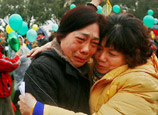
The fifth BRICS Summit is being held in Durban, the second largest city in South Africa, completing the first cycle of summits.
The biggest topic at the conference is launching of a joint development bank and a foreign-exchange reserves pool, an initiative launched by New Delhi and backed by other members. But on a nuts-and-bolts level, the BRICS countries do not share a position on many issues such as the main currency of the bank and the location of the bank headquarters.
Nevertheless, there is an agreement that a joint development bank should be established. If things go smoothly, the launch of this bank may be announced officially in Durban.
The establishing of the joint development bank and the foreign-exchange reserves pool will not only make the financing of BRICS countries' infrastructure more convenient, but also be conducive to infrastructure construction in vast developing countries, including African ones.
Moreover, it will play a role in maintaining the stability of the international financial market and promote the reform of international monetary and financial systems.
Another highlight of this summit is the interaction between BRICS nations and African organizations and countries. As the host country, South Africa has invited regional economic integration organizations and leaders of regional powers in Africa.
With the increasing of the economic and trade exchanges between BRICS countries and African countries, African economy grows prosperous. According to the Standard Bank of South Africa, BRICS total trade with Africa reached $340 billion in 2012, representing a more than 10-fold increase over the course of a decade.
The economic and trade cooperation between BRICS countries and Africa sticks in Western countries' throat. They often express some absurd arguments such as accusing China of implanting "neo-colonialism" in Africa.
Also, due to the lack of coordination, there is competition among BRICS nations when they develop their trade and economic relations with African countries.
Solving these problems requires joint consultation between BRICS nations and African countries and organizations. Positive interaction will be a strong impetus to the economic development of Africa and the achievement of a mutually beneficial situation.
Over the past years, BRICS has made huge progress. Both political and economic cooperation are developing healthily.
Under the impetus of BRICS, the IMF and World Bank put forward plans for voting reform. But because of opposition from the US Congress, the plans are still unable to be implemented. Only cooperation among BRICS countries can make Western countries take this reform plan seriously.
Instead of overthrowing the current international financial system, BRICS countries seek to promote progressive reform to make the system more just and reasonable.
Although it is relatively weak compared with economic cooperation, cooperation among BRCIS countries in politics and security is developing gradually.
As with other BRICS summits, there were also meetings of senior representatives of national security affairs for the countries to exchange views on international hot spots. After the New Delhi summit, India called a special meeting of senior representatives of national security affairs in January to coordinate BRICS countries' stances on international and regional issues. All these highlight BRICS countries' important roles on international political and security issues.
Before the Durban summit, the city hosted a seminar on defense issues. South Africa delegation on national defense also visited several BRICS countries. This may indicate that BRICS countries will further enhance cooperation on defense.
The purpose of doing so is not to establish a military alliance like NATO. Instead, BRICS countries want to be an alliance of civilizations to discover a new model for countries to achieve peaceful coexistence.
Cooperation among BRICS nations is conducive to making the world economy more balanced, the global economic governance more comprehensive and international relations more democratic. The future of BRICS will be bright and colorful, just like the five-color sunrise, the logo of the Durban summit.
The author is a research fellow of the Center for South Asia Studies at the Shanghai Institutes for International Studies. opinion@globaltimes.com.cn
















 'A Beautiful Daughter-in-law Era' drama hits Africa
'A Beautiful Daughter-in-law Era' drama hits Africa


![]()
